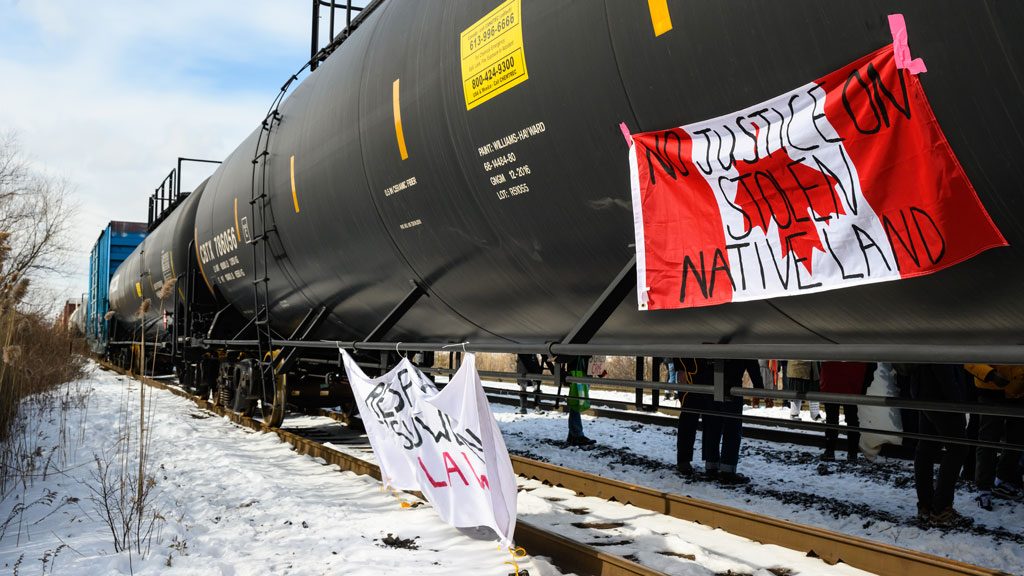To add to the misery of another interminable Canadian winter, rail lines across the country have been paralyzed for weeks by blockades erected by Indigenous protesters and their supporters.
The blockades were put in place in solidarity with a group of Wet’suwet’en First Nation (FN) hereditary chiefs who oppose a natural gas pipeline in their traditional territory in north-western B.C.
The spark that ignited the fire is the Coastal GasLink pipeline, a 400-mile project that would ship natural gas from north-eastern BC to the coast.
The conflict over the project, which has risen to a fever pitch, has two complex, interconnected and contentious parts.
The first is opposition to the pipeline itself; the other is wrangling over FN governance, FN rights and reconciliation with the non-FN population.
Although the Canadian construction industry has not been directly affected by the blockades, it is nevertheless paying close attention, as the stand-offs grind on without an overall an end in sight.
“Canada’s rail network plays an important role in the movement of materials used in construction and in many other industries,” said Chris Atchison, president of the BC Construction Association.
“There’s no question that disruptions to rail service will impact projects, employers, workers and their families, so we look forward to a respectful solution that will keep Canada’s trains moving for the people who depend on them. When it comes to building our economy and our capacity as a nation, we’re all in this together, across Canada and across industries.”
John Gamble, president and CEO of the Association of Consulting Engineering Companies-Canada says consulting engineers are affected by the blockade insofar as the rail disruption affects contract administration or engineers’ performance as owners’ agents.
The rail disruptions have the potential to reduce the number of construction projects that get built,
— Alex Carrick
ConstructConnect
“If the blockade continues, there will be concerns about project delays or delays in awarding projects,” said Gamble. “And there could be cost escalation on some projects, too.”
Alex Carrick, chief economist of ConstructConnect, says many building products, such as dimension lumber and structural steel, are shipped by rail. “The alternative is shipping by truck, which costs more and is more harmful to the environment,” he said.
Carrick says the Canadian economy as a whole is very dependent on our railway system, not just east-west, but also north-south, between Canada and the U.S. and Mexico.
“The main impacts of the blockades are disrupted supply chains and a discouraging effect on owners who are deciding where to locate their businesses,” said Carrick. “The blockades are another black eye for Canada and could discourage owners from building in Canada. In other words, the rail disruptions have the potential to reduce the number of construction projects that get built in this country.”
In many parts of Canada, transportation of goods and people by rail gets less attention than it deserves, says Barry Prentice, a transportation economist in the department of supply chain management in the University of Manitoba’s Asper School of Business.
“Many people in Canada, particularly those who live in our biggest cities, don’t often think about the importance of railways for holding our country together and keeping our economy humming along,” said Prentice. “They just take it for granted, like turning on a faucet and water comes out. But rail is essential to our national wealth.”
Canadian National Railway and Canadian Pacific Railway carry the bulk of Canadian freight, although there are also a few short-line railways.
Railroads are important to the economies of every region in Canada, although trucking is important in Ontario and Quebec. Trucks carry many tonnes of manufactured products in both directions across the U.S. border.
“We export raw materials, like forest products and minerals, to the rest of the world, and, in turn, import finished products,” said Prentice. “In addition, we use rail in Canada to ship toxic and combustible materials, such as chlorine, which we use to purify water. Although there are occasional incidents, rail is much safer than road.”
Prentice says Canada is much more dependent on rail than the U.S.
“There are several reasons, but essentially, Canada depends on the railways to move heavy export commodities long distances, whereas the U.S. has less dependence on exports and sells more manufactured goods, many of which they can ship by truck,” he said.
In addition, the extensive U.S. rail network is less prone to traffic being stalled at single choke points on rail lines.
“The U.S. has five Class 1 railways, and Canada has only two, so they have more routes to market,” said Prentice. “They also have a lot more ports to choose from for shipping, and the big Mississippi River.”











Recent Comments